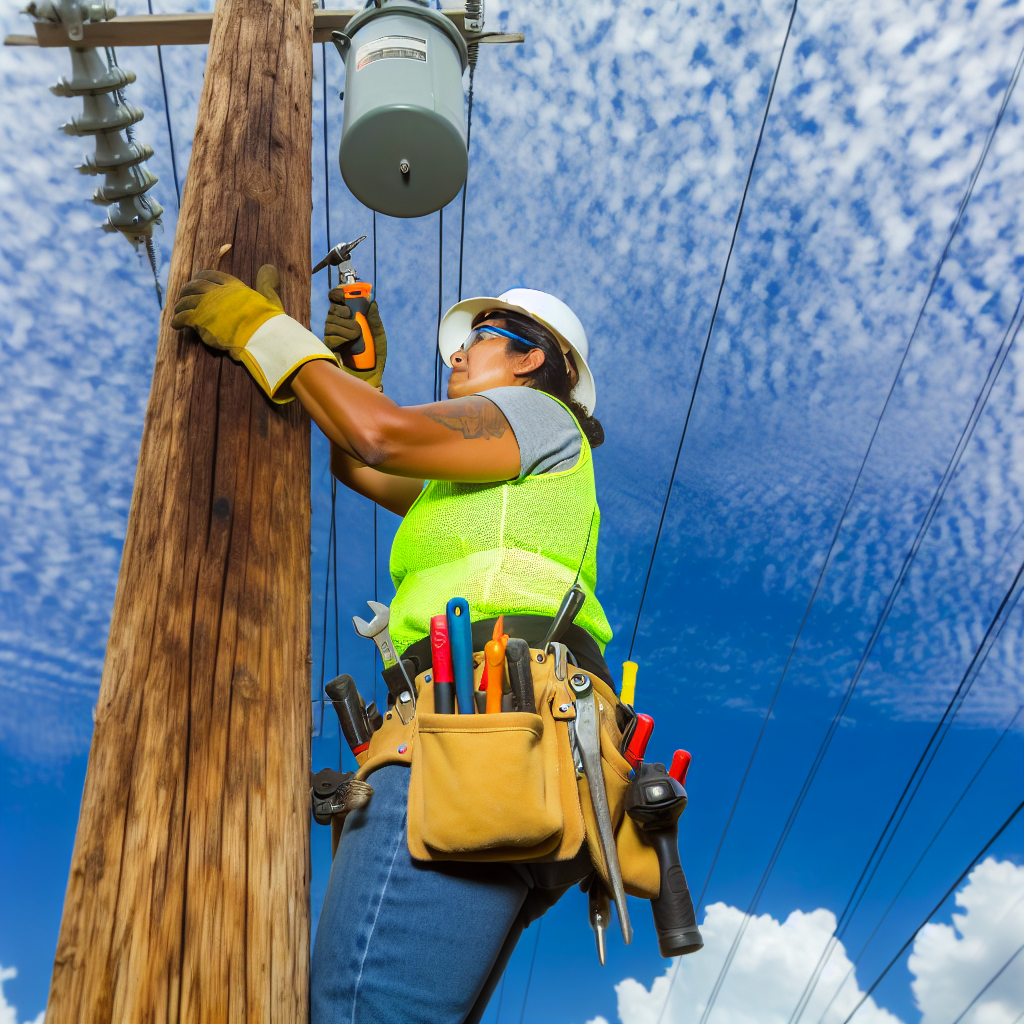Introduction:
Power line installers are responsible for installing and repairing electrical power systems.
It is crucial for them to possess essential skills to ensure efficiency and safety in their work.
Technical Knowledge:
Power line installers must have a solid understanding of electrical systems and equipment to perform their duties effectively.
They should be familiar with different types of power lines, transformers, and other related components.
Physical Fitness:
Due to the nature of their job, power line installers need to have good physical strength and stamina.
They often work at heights and in challenging weather conditions, so being physically fit is essential to avoid accidents and injuries.
Problem-Solving Skills:
Power line installers must be able to troubleshoot issues and find solutions quickly and efficiently.
Having strong problem-solving skills helps them identify and resolve electrical problems effectively.
Attention to Detail:
Being detail-oriented is important for power line installers to ensure that all connections and installations are done accurately.
Even a small error in installation can lead to major electrical issues, so attention to detail is crucial in this profession.
Communication Skills:
Effective communication is essential for power line installers to work as part of a team and coordinate tasks efficiently.
Clear communication helps in preventing misunderstandings and ensures that everyone is on the same page during installations.
Safety Consciousness:
One of the most critical skills for power line installers is a strong commitment to safety protocols and procedures.
They need to be constantly aware of potential hazards and take proactive measures to prevent accidents and ensure a safe working environment.
Physical Fitness:
Power line installers have a physically demanding job that requires strength and endurance.
Constant lifting of heavy equipment is a regular part of the job.
Working at heights is common and requires physical stability and agility.
Physical fitness is crucial for preventing injuries on the job.
Being able to maneuver in tight spaces and awkward positions is necessary.
Knowledge of Electrical Systems and Equipment
Power line installers must have a deep understanding of electrical systems and equipment.
Transform Your Career Today
Unlock a personalized career strategy that drives real results. Get tailored advice and a roadmap designed just for you.
Start NowThis includes knowledge of how electricity works, as well as the different types of equipment and tools that are used in the field.
Without this knowledge, it would be impossible to safely and effectively install power lines.
Ability to Understand Blueprints and Technical Diagrams
Another important technical skill for power line installers is the ability to read and understand blueprints and technical diagrams.
These documents provide detailed instructions on where and how power lines should be installed, so being able to interpret them accurately is crucial.
This skill ensures that power line installers can work efficiently and accurately, reducing the risk of errors or accidents on the job.
Having strong technical skills is essential for power line installers.
Without these skills, it would be challenging to perform the tasks required for the job effectively and safely.
By continuously developing and honing these technical skills, power line installers can ensure that they are well-prepared to handle any challenges that come their way in the field.
You Might Also Like: Miner Safety Tips: Staying Safe Underground
Safety Awareness:
Understanding the importance of following safety protocols is crucial for power line installers.
Training in electrical safety and first aid is essential to prevent accidents and injuries.
- Understanding the importance of following safety protocols is crucial for power line installers.
- Training in electrical safety and first aid is essential to prevent accidents and injuries.
Gain More Insights: The Impact of Mining on the Environment
Problem-Solving Skills:
Power line installers must possess strong problem-solving skills to effectively address any issues that may arise during their work.
Whether it’s a faulty connection or a damaged line, being able to troubleshoot and identify the root cause of the problem is crucial in maintaining a safe and efficient power grid.
Moreover, power line installers often find themselves in emergency situations where quick thinking is essential.
They must be able to make split-second decisions to prevent further damage or outages, ensuring the safety of themselves and others around them.
Having the ability to think on their feet and come up with creative solutions is a valuable asset for power line installers.
They must be able to adapt to changing circumstances and find innovative ways to overcome any challenges they may encounter on the job.
Overall, problem-solving skills are critical for power line installers to effectively carry out their duties and ensure the reliability of the power grid.
- Ability to troubleshoot issues with power lines
- Quick thinking in emergency situations
Learn More: Top Safety Tips for Dockworkers Handling Heavy Cargo
Transform Your Career Today
Unlock a personalized career strategy that drives real results. Get tailored advice and a roadmap designed just for you.
Start NowCommunication Skills:
Effective communication skills are crucial for power line installers.
Here are some key aspects:
Team Coordination:
Power line installers often work in teams to complete installations efficiently.
Communication within the team is essential to coordinate tasks effectively.
By clearly conveying instructions, sharing updates, and addressing any concerns, installers can ensure that the project progresses smoothly.
Team members must be able to communicate their needs, discuss solutions, and make decisions collectively.
Clear Communication with Supervisors:
It is important for power line installers to communicate clearly with their supervisors.
They should provide updates on the progress of installations, report any issues or challenges encountered, and seek guidance when needed.
Supervisors rely on accurate information from installers to make decisions and ensure the successful completion of projects.
Customer Communication:
Power line installers must also communicate effectively with customers.
This ensures satisfaction and addresses any concerns they may have.
Clear communication with customers regarding project timelines, potential disruptions, and safety measures can help build trust and maintain positive relationships.
Installers should be able to explain technical information in a way that is easily understandable to customers who may not be familiar with power line installations.
Problem-Solving:
Effective communication skills also play a crucial role in problem-solving.
When faced with challenges or unexpected issues during installations, power line installers need to communicate with team members, supervisors, and customers.
This helps them find solutions quickly.
By discussing the issue, sharing ideas, and seeking input from others, installers can overcome obstacles.
They can ensure the successful completion of projects.
Safety Communication:
Clear communication regarding safety protocols and procedures is essential for power line installers.
This helps prevent accidents and injuries.
Transform Your Career Today
Unlock a personalized career strategy that drives real results. Get tailored advice and a roadmap designed just for you.
Start NowInstallers must be able to communicate safety instructions, hazard warnings, and emergency procedures effectively.
This ensures that everyone involved in the project is aware of potential risks and follows proper safety practices.
By promoting a culture of safety through open communication, installers can contribute to a safe work environment for themselves and their team members.
Delve into the Subject: Top Tools for Efficient Drywall Installation

Attention to Detail:
Attention to detail is a crucial skill for power line installers. Any small mistake can lead to serious accidents. It can also disrupt power supply.
Here are some key aspects of how attention to detail plays a significant role in the work of power line installers:
Precision in installing and maintaining power lines:
Power lines are complex systems. They require precise installation and maintenance to ensure proper function and safety.
Power line installers must pay close attention to every detail. This includes the positioning of the poles and the connection of the wires.
A small error in any part of the installation process can result in system failure. It can lead to power outages and potential safety hazards.
Checking for errors to prevent accidents:
Power line installers are responsible for inspecting the work. They must identify any errors or issues that could compromise safety.
By paying attention to detail during inspections, installers can catch potential problems early. This helps prevent accidents before they happen.
This includes checking for loose connections and corrosion on the wires. Identifying signs of wear and tear is also essential.
Attention to detail is an essential skill for power line installers. It ensures the safety and efficiency of power distribution systems.
By being meticulous in their work, installers can prevent accidents. They help maintain the reliability of power lines for the community.
Effective Time Management for Power Line Installers
Proper time management is crucial for power line installers to ensure projects are completed on time and within budget.
Here are some essential skills for mastering time management in this field:
- Meeting deadlines for installations and repairs
- Prioritizing tasks to maximize efficiency
One of the first steps in effective time management is setting realistic deadlines for installations and repairs.
Power line installers must assess the scope of work and allocate sufficient time for each task to avoid delays.
Power line installers can benefit from using task management systems or digital tools to keep track of their daily tasks and priorities.
By organizing tasks in a systematic manner, installers can ensure they are focused on what needs to be done first.
Transform Your Career Today
Unlock a personalized career strategy that drives real results. Get tailored advice and a roadmap designed just for you.
Start NowPrioritizing tasks is essential to maximize efficiency in power line installations.
Installers should identify critical tasks that need immediate attention and allocate time accordingly.
By focusing on high-priority tasks first, installers can prevent delays and meet project deadlines.
Proper resource allocation is key to effective time management.
Power line installers must assess the availability of resources such as manpower, equipment, and materials when planning tasks.
By allocating resources wisely, installers can streamline the installation process and avoid wastage.
Delegating tasks to team members can help power line installers manage their workload more efficiently.
By assigning specific tasks to individuals based on their skills and strengths, installers can ensure tasks are completed on time and meet quality standards.
Effective communication is essential for coordinating tasks and ensuring everyone is aware of project timelines.
Power line installers must communicate clearly with team members, supervisors, and clients to avoid misunderstandings and delays.
By keeping all stakeholders informed, installers can prevent last-minute changes that can impact project timelines.
Regularly monitoring progress is essential for effective time management.
Power line installers should track the status of tasks, identify any delays or obstacles, and take corrective actions to stay on schedule.
By staying proactive and addressing issues promptly, installers can prevent project delays and ensure timely completions.
Time management plays a crucial role in the success of power line installations.
By mastering the essential skills of setting realistic deadlines, prioritizing tasks, allocating resources wisely, delegating tasks, communicating effectively, and monitoring progress, power line installers can ensure projects are completed efficiently and on time.
Adaptability:
Power line installers often find themselves working in a variety of weather conditions.
Whether it’s scorching heat or freezing cold, these professionals need to be able to adapt and continue working efficiently.
Additionally, power line installers may encounter different work environments, from urban areas to remote locations.
They must be flexible and able to adjust to these varying conditions to complete their tasks effectively.
Transform Your Career Today
Unlock a personalized career strategy that drives real results. Get tailored advice and a roadmap designed just for you.
Start NowAdaptability is crucial for power line installers to ensure that they can overcome any challenges.
They face challenges while working on installing, repairing, or maintaining power lines.
Skills Required for Power Line Installers
Power line installers must possess a unique set of skills to successfully carry out their job responsibilities.
These essential skills include physical strength, attention to detail, problem-solving abilities, technical knowledge, and communication skills.
They play a crucial role in our communities by ensuring the safe and efficient distribution of electricity to homes, businesses, and essential services.
Furthermore, their work helps to keep our modern world functioning smoothly.
By highlighting the importance of these skills, we can appreciate the dedication required for this demanding profession.




